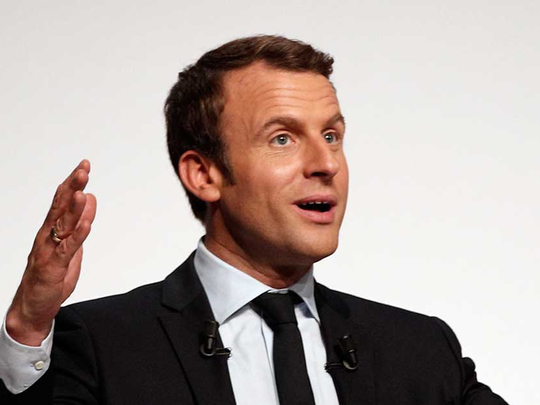
Paris: They call him the “radical centrist.”
This is the way Emmanuel Macron, the photogenic, 39-year-old independent candidate poised to win the French presidency next weekend, is often described in the French and foreign press.
But even Macron’s closest advisers say there is little about the political platform of a former investment banker that can be considered “radical.”
In nods to both the left and the right that mirror the programs of third-way centrists such as President Bill Clinton and British Prime Minister Tony Blair from the 1990s, Macron has proposed a middle way that would heavily invest in health and agriculture at the same time as it would trim a costly public sector.
What is “radical” about Macron, his advisers insist, is the candidate himself, a political outsider who, against all odds, is the only option for those who wish to protect France’s embattled political establishment. This, they insist, is Macron’s not-so-secret weapon in combating the rising tide of populism: if what he proposes is not quite a departure from the political status quo, he is not a familiar face.
“It’s an oxymoron, ‘radical centrism,’ “ Jacques Attali, a prominent French economist and public intellectual who has been an informal adviser to Macron for months, said in an interview. “What he is what you call ‘bipartisan.’ He’s not Marx; his program is not an ideology per se. It’s pragmatism.”
In certain respects, Macron’s “pragmatism” is traditional, the almost predictable orientation of a centrist social democrat or a moderate American liberal. He has called for a massive €50 billion (Dh200 billion or $55 billion) public investment, but, at the same time, he has also vowed to slash as many as 120,000 public-sector jobs and to continue liberalising the French labour market — despite the immense difficulties the Hollande administration faced when it tried to do the same in 2016.
Not surprisingly, Macron has been called a French Bill Clinton.
But in the global political climate of 2017, those who have advocated ideas like these have not done well. Democrat Hillary Clinton lost the US presidential election with a similar platform, and the British campaign to remain in the European Union was sorely defeated in the Brexit referendum. In both cases, a large number of voters railed against the “system.”
Much of that same anti-establishment sentiment has defined the French presidential campaign. Although Macron came out on top in the first round of the vote, a staggering 49 per cent of voters ultimately backed populist candidates on the far-right or the far-left whose central message, in different terms, has been anti-establishment fervour.
Furthermore, some of these candidates, especially the far-right Marine Le Pen, have targeted the former investment banker and one-time Socialist economy minister as the very essence of the “system” to be destroyed.
But the strategic problem for Le Pen is that Macron, an entirely unknown quantity just three years ago, cannot quite be written off as an establishment candidate, even if his ideas have captivated a significant number of establishment figures in the process.
Jean Pisani-Ferry, a prominent French economist and public policy expert, was among the principal collaborators on Macron’s platform.
Its animating theme, he said, is that it offers a vision of an as-yet-untested future in a society that has rejected, for the first time in the history of the Fifth Republic, both the centre-left and the centre-right.
“The idea is that we can untangle French society, liberate, unlock — that we can do that, and that we can re-create the potential for innovation and development, a system of social protections that works well in a modern economy,” he said in an interview. “That’s the aspiration.”
To that end, Macron’s third-way pragmatism — “neither left nor right,” as the candidate frequently reiterates — ultimately comes wrapped in the packaging of lofty idealism. Younger voters often say that it is the idealism — rather than the policies — of the man who would be France’s youngest-ever president that ultimately defines his sprawling and, some say, nebulous agenda.
“The project I propose to you, is to build with you a new France, which innovates, searches, creates and lives, a France of prosperity reclaimed and of progress for everyone,” Macron’s platform reads, promising a new “contract with the nation.”
Pisani-Ferry rejected the charge, from across the political spectrum, that pronouncements like these are vague.
“But more vague than what?” he said. “The people who criticise the program for not having all the marks of the left or the right are clinging to traditional approaches in political life.”
Strictly speaking, France has never before elected a centrist president. In an electoral campaign otherwise devoted to what the French all “dgagisme” — loosely translated as “throw them out-ism” — electing a centrist in 2017 could be the protest analysts and pollsters have anticipated for months.
Attali, the economist, said he does not see a Macron victory — which polls still unanimously predict — as a revolution, but rather as a potential reset for a political system mired in dysfunction.
“It’s a parenthesis,” he said. “A necessary parenthesis.”












